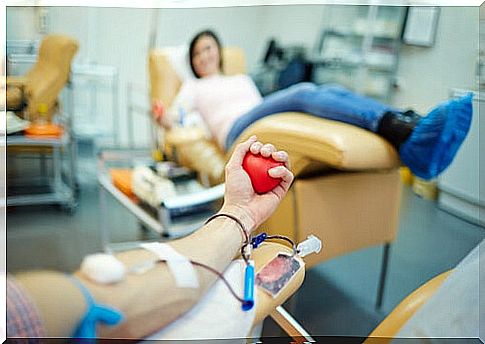How To Prepare Before Donating Blood?
Donating blood is an act that many people wish to do at some point in their lives. However, it is necessary to know what are the conditions that must be met to do it in the best possible way.
The aim is to avoid extreme weakness after donation, as well as other complications. Some volunteers may experience dizziness, either caused by nerves or tension.
It is important to remember that donating blood is not a matter to be taken lightly, so consult your GP first.
If for some reason any of the requirements are not met, it is best to postpone the idea. Next, we inform you a little more about it.

Main obstacles to donating blood
There are some obstacles that prevent many people from donating blood. According to this report from the Red Cross Blood Donation Center, the main ones are the following:
- Not be of legal age.
- Having undergone a surgical operation 6 months before or having had a force majeure accident.
- Weigh less than 50 kg.
- Having certain diseases, such as epilepsy, tuberculosis, cancer or heart disease.
- Consumption of drugs.
- Pregnant or lactating women.
- Have multiple sexual partners.
- Suffering from venereal diseases such as HIV, syphilis, gonorrhea, and hepatitis B or C.
- Being sick the day of the donation.
- The person is an insulin-dependent diabetic.
- Not having fasted.
- Having received organ transplants.
- Having had piercings, tattoos, acupuncture, or catheterization in the last 12 months.
- Recent trips to countries with epidemiological outbreaks.
- Having been admitted to mental institutions or jail.
- Fear of needles (belonephobia).
How is it the procedure?
Once the donor is received, the admission process is carried out. This consists of a reading on the legal aspects that the donation implies and then it is required to fill in a form in which data such as the following are indicated:
- Name.
- Age.
- Gender.
- Weight.
- Height.
- Blood type.
The admission process ends with the signing of a consent or authorization by the donor. Now, the donation as such consists of the extraction of a total of 450 ml of blood.
The procedure is performed by a member of the healthcare staff, while the person lies in an armchair. The time to obtain this quantity, in general, is approximately 15 minutes.
At the end of the blood collection, the donor must rest for a few minutes. Afterwards, health personnel usually offer a snack consisting of a solid food and a liquid (water or juices), which will help you regain energy and replace fluids.
Once the person has donated blood, it is processed for 24 hours. This is known as “fractionation”, which consists of the division of red blood cells, plasma and platelets and analysis.
The process can be repeated every two months and up to 4 times a year for men; in women, the maximum is 3 times a year.
How do I prepare before donating blood?
This is a very common question and worth answering. If you plan to donate blood, pay attention to the previous steps:
1. Plan
It is important to learn and plan when donating blood, since donation centers may have a schedule for it or require an appointment.
In case the hours are not convenient for you, you can ask if there will be an upcoming donation day or campaign to take place.
2. Look for foods rich in iron
If you want to donate, it is advisable to eat a balanced diet. If you want to take additional measures in this regard, consult your GP because it is likely that you will be recommended to increase your iron intake.
Among the foods with the highest amount of iron are spinach, fish, eggs, lentils, beef and whole grains. The day you make the donation, you can try dishes containing these ingredients for lunch or dinner.
3. Drink lots of water
Hydration is important at any time, but when donating blood it can be very useful to help prevent dizziness and fainting.
Remember that the drop in blood sugar levels and blood pressure is common after donation.
However, do not worry because this does not happen to everyone. The calmer and more relaxed you are, the better.
4. Rest
As we have mentioned before, the donor must be as relaxed as possible before and after donating blood. For this reason, it is recommended to get a good night’s sleep (at least 7 hours in a row).
In the same way, after making the donation it is recommended that you go home. Do not do any type of physical exercise the rest of the day, or go shopping or work. Your body will need to replenish itself.

Remember to be responsible
Please note that poor quality blood cannot be donated as this would put other people at risk. Do not lie on the application, since all you will do is cause problems.
Donating blood is an act of love and helps others. Therefore, be consistent with reality and inform yourself well before doing it. You can save many lives thanks to a small gesture.









